Israeli Coffee Overview, Equipment and Recipes
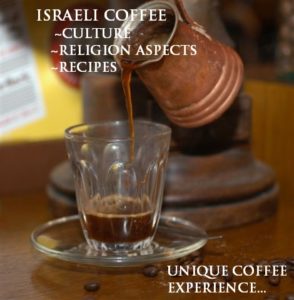 Israeli coffee is very popular to a lot of people around the world. Especially to Jewish populations immigrated in other countries.
Israeli coffee is very popular to a lot of people around the world. Especially to Jewish populations immigrated in other countries.
The religious fact of the kosher label on the coffee packages makes it a stand-alone issue.
Coffee culture in Israel has started a long time ago, since its state declaration in 1948. A lot of Jews were living in Europe. They had established excellent coffee business in roasting and grinding coffee beans.
After the holocaust and their settlement to homeland they started contributing their coffee knowledge to Israel.
![]()
What is Israeli coffee?
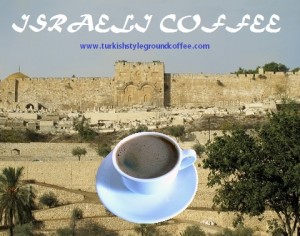 Israeli coffee is famous for its rich aroma and one of a kind taste. You can prepare it in two different ways:
Israeli coffee is famous for its rich aroma and one of a kind taste. You can prepare it in two different ways:
(a) The cooked version - “Kafe Turki” or nowadays “Kafe Shachor” (“black coffee”).
(b) The uncooked version that is unique in Israel and they call it “Kafe Botz” (“mud coffee”).
The use of cardamom spice in both versions is very common. The people of the Middle East region are very fond of this aroma and taste. Many people call it “Jewish coffee” or “Israeli Turkish coffee” or “Arabic coffee”.
The original name of the coffee has changed from “Turkish” to “Israeli”. The main reason of that modification is mainly political but also new marketing strategies.
Preparing Israeli coffee is proficiency. It is also a natural tradition when working in “kibbutz”, go out for camping or just serve in the army.
It’s a tradition in Israel to bring coffee to a friend’s house for Shabbat. Coffee is an excellent addition to a Mishloach Manot basket for the Jewish holiday of Purim.
![]()
Israeli coffee and the kosher aspect
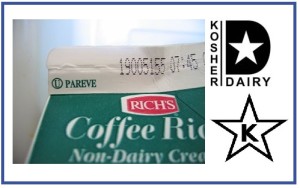 Kosher means “fit for eating/consumption”. There is a description of these foods and drinks in the Bible (Leviticus chapter).
Kosher means “fit for eating/consumption”. There is a description of these foods and drinks in the Bible (Leviticus chapter).
For the Jewish faith followers it is considered a very important aspect of their religion.
Kosher food follows strict guidelines on preparation for food based on Halachic Jewish laws. (You care for more details about kosher food laws? You can check this article “Kashrut: Jewish Dietary Laws” from the online encyclopedia of Judaism).
If a coffee brand is certified as kosher it means several things. Among those the two most important are the following:
-
- The first material as well as processing machinery or utensils used in the premises was according to Jewish Law.
- A Rabbi was present and observing the production.
Kosher food isn’t the easiest thing to find outside of Israel. So, you have to trust the place where you are shopping from.
Coffee beans are naturally kosher. They can only contact water. During the process to obtain the right flavor though might break the Jewish dietary laws.
Packing and storage may also be a problem. Some non-kosher materials can modify the kosher status of coffee.
Note: On kosher products you sometimes see the words Parve (Hebrew) or Pareve (Yiddish). It’s the term that describes food without any meat or dairy ingredients. (i.e. fish, eggs, fruits, vegetables, grains).
![]()
How to make Israeli coffee
Before proceeding with any of the recipes that I present below make sure that you have some basic necessary utensils needed (finjan & small coffee cups or glasses) and of course some authentic Israeli ground coffee.
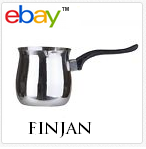 Finjan- It’s a special pot with a long handle. It is wider at the bottom and narrow at the top. It comes in different sizes and materials. Enamel and stainless steel pots are the most popular though throughout Israel.
Finjan- It’s a special pot with a long handle. It is wider at the bottom and narrow at the top. It comes in different sizes and materials. Enamel and stainless steel pots are the most popular though throughout Israel.
This utensil comes in different sizes; from a small one -1 coffee cup- to extra large -7 or 8 cups of coffee.
In order to fulfill various serving situations you need at least 2 different sizes. In Israel most of the houses have sets of 5.
Cup – The Espresso style cup is fine. In Israel though the “glass cup” is the most popular one among the locals.
The plain white porcelain cup (usually with coffee brand logos) is the main cup of the traditional coffee shops.
An equivalent replacement to the above options could be the white espresso cup which is very easy to find worldwide.
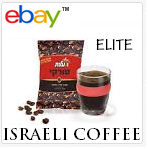 Israeli Ground Coffee – There are plenty of choices in eBay if you are away from supermarkets or small stores with ethnic food.
Israeli Ground Coffee – There are plenty of choices in eBay if you are away from supermarkets or small stores with ethnic food.
Israelis are not very fond of using hand-mills in order to grind roasted coffee beans. They prefer ready made Israeli brands -for religious reasons as well.
(A) Cooked black coffee version - Traditional Israeli style
Ingredients: (1 demitasse cup)
-
- 1 cup (espresso size) of water (better to be from bottle rather than tap)
- 1 cup (espresso size) of water (better to be from bottle rather than tap)
-
- 1 full teaspoon of your favorite Israeli ground coffee
- 1 full teaspoon of your favorite Israeli ground coffee
-
- Use sugar according to your taste (Most Israelis add 1-2 teaspoons).
- A pinch of cardamom. (If you like its smell – This is the characteristic aroma of Middle East and Israelis use it widely).
The making process:
1) Add the water into the appropriate “finjan” and place it on a low to medium heating source.
Note: DO NOT use a big “finjan” for a few cups of coffee. Prefer to have at least two sizes of pots in order to cover different orders. Otherwise you will end up with unsuccessful coffee cups -meaning without any foam.
2) Heat for a while and add the sugar (if used).
3) Stir until you dissolve the sugar into the water.
4) Let it come almost to the boiling point.
5) Remove from the heating source and add coffee and cardamom (if used).
6) Stir well and quickly (with the same teaspoon) until you dissolve the ingredients.
7) Return the pot on the heating source and continue stirring for a while until the coffee foams up.
8) Pour the coffee at once into a demitasse cup or small glass (100 ml. capacity).
(B) Cooked black coffee - Arabic version
In Israel you can find a lot of ways to brew this type of coffee. The following is very common among the Arab population of the country.
-
- Put the appropriate water into the “finjan” (1 demitasse cup for each person).
- Place the coffee pot on a stove with high heat and let it come to boiling point. Remove it from the heating source.
- Add 1 teaspoon of coffee (cardamom flavor is preferable) for each cup. Lower the heat and stir well while brewing again.
- Let it rise two times, remove from heat and add preferable amount of sugar (if any).
- Cover the pot with a lid or a saucer. Let it sit for 2 minutes, allowing coffee grounds to settle at the bottom.
- Pour into small “ghawa” cups and serve.
- Put the appropriate water into the “finjan” (1 demitasse cup for each person).
(C) Mud (‘Botz’) coffee version - Israeli style
The recipe is pretty simple.
-
- Take a small drinking glass or a mug.
- Add 1 teaspoon (small glass) / 2 teaspoons (mug) of Israeli coffee (plain or with cardamom).
- Add sugar (if you use). Add a pinch of cardamom in plain coffee if you like the certain aroma.
- Pour in hot water (you can also use hot milk instead of water).
- Stir well. Let the mixture stand for a few minutes. You will see the coffee grounds settling at the bottom.
The grounds don’t dissolve properly in the water so they leave a sandy taste during the last few sips.
The name ‘mud coffee’ is a description of the coffee grounds. They take the format of mud in the bottom of the cup.
![]()
Main differences in Israeli coffee making from “classic making”
-
- Water comes to almost boiling point into the “finjan”. Most of the classic Turkish style recipes tell you the opposite. “Use cold water to let coffee cooking for longer time“.
The Israeli way of brewing this type of coffee asks for more experienced coffee making people. Foam will rise very fast. You must be ready to remove the “finjan” from the heat source at once to prevent spilling!
-
- Cardamom is a Middle East preferable spice and in Israel has its place in its coffee culture. A ready grind is available from coffee manufacturers. They mix certain amount of ground cardamom with the coffee powder.
If you like a stronger smell you mix it yourself with plain coffee in the brewing process. This special variety of coffee is called in Hebrew “Kafe im hel”. Most foreigners know it as “Arabic coffee”.
- Cardamom is a Middle East preferable spice and in Israel has its place in its coffee culture. A ready grind is available from coffee manufacturers. They mix certain amount of ground cardamom with the coffee powder.
Note: Instead of cardamom powder you can use whole cardamom pod. You put it during the stage that you mix coffee and hot water. People usually take it off before pouring the coffee in the cup. If you like you can leave it there for extra aroma. (Be careful not to swallow it while sipping your coffee!!).
-
- The foam ritual is not present in Israeli coffee as in other Turkish style coffee drinking cultures. Since the water is already hot, the foam is ready. If you continue cooking the coffee 2-3 times you will end up with no-foam coffee (unless this is your preference).
-
- Small drinking glasses, that withstand sudden thermal shock, are widely used to serve the coffee along with contemporary demitasse cups.
![]()
Coffee cup reading tradition
Middle East is famous for its fortune telling practices mostly on coffee cup grinds. The tradition started from those regions so it is logical to have lots of followers. Even if the religions of the area don’t approve these practices.
Expert coffee readers interpret symbols created in the coffee grounds either for serious customers or for fun in friendly gatherings.
The ritual is the same one that I described thoroughly in my unique coffee reading webpage. There, you can get full details you might need plus a FREE list of 200+ symbols for your starting adventure.
Below you can see at a glance how you can divide your cup:
-HANDLE AREA = It represents you and present events.
 -FRONT RIM AREA = This id your future area with happenings that have no relation with your home.
-FRONT RIM AREA = This id your future area with happenings that have no relation with your home.
Rim area = Whatever it is on that area you will consider them as a positive sign.
-LEFT handle area = This is your past.
-RIGHT handle area = Interpret the symbols as today happenings or maximum up to a week time.
Bottom of the cup = Events that will appear in a month time.
Bottom area = Negative sign area.
![]()
Traditional Israeli coffee compliments
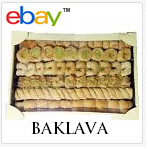 Baklava and other small sweets usually accompany an Israeli coffee.
Baklava and other small sweets usually accompany an Israeli coffee.
For those missed Israel I suggest this mixed baklava tray (KOSHER Badatz Haeda Ha Haredit) directly from Israel.
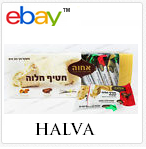 Another popular Jewish snack that accompanies coffee in many cases is halva.
Another popular Jewish snack that accompanies coffee in many cases is halva.
Achva mixed package flavors (kosher) is a nice choice. It enhances all the flavors and traditions of Israel.